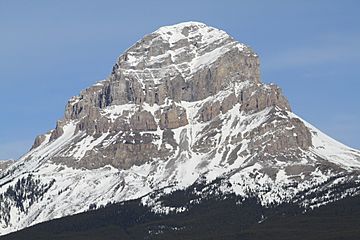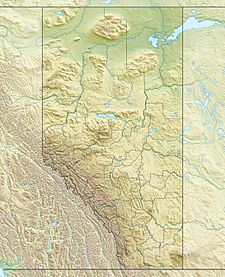Crowsnest Mountain facts for kids
Quick facts for kids Crowsnest Mountain |
|
|---|---|

Crowsnest Mountain, March 2010
|
|
| Highest point | |
| Elevation | 2,785 m (9,137 ft) |
| Prominence | 925 m (3,035 ft) |
| Parent peak | Mount Erris |
| Listing | Mountains of Alberta |
| Geography | |
| Parent range | Crowsnest Range |
| Topo map | NTS 82G/10 |
| Geology | |
| Age of rock | Paleozoic (upper), Mesozoic (lower) |
| Mountain type | Limestone |
| Climbing | |
| First ascent | July 28, 1904 by Tom Wilson, Christian Hasler sr., Friedrich Michel |
| Easiest route | moderate scramble |
Crowsnest Mountain is a beautiful mountain located in the southern part of the Canadian Rockies in Alberta, Canada. You can easily spot it from Alberta Highway 3 as you drive west of Coleman, near the Crowsnest Pass. The mountain got its name from the Cree First Nations people because they saw many ravens nesting there. People first climbed the north side of the mountain using a 'scrambling' route in 1915.
Mountain's Rocky History
Crowsnest Mountain is made up of very old rocks. The grey cliffs at the top are mostly limestone and shale. These rocks formed a long, long time ago, during the Devonian and Mississippian periods. That's about 320 to 420 million years ago!
How the Mountain Formed
Imagine giant forces pushing the Earth's crust. That's what happened here! These ancient rocks were pushed up from the west. They slid over younger rocks along something called the Lewis thrust fault. Think of it like a giant, slow-moving landslide of rock layers.
This movement caused the rocks to fold into a wide U-shape, known as a syncline. The lower, wooded parts of the mountain are made of younger rocks. These younger rocks are from the Cretaceous period, which was about 65 to 145 million years ago.
An Isolated Peak
The rocks that make up Crowsnest Mountain were once connected to a larger rock sheet. This sheet stretched all the way to the High Rock Range in the west. However, over millions of years, a creek called Allison Creek slowly carved its way through the rock. This erosion cut off Crowsnest Mountain and its neighbor, Seven Sisters Mountain. Now, they stand together as an isolated piece of rock, which geologists call a klippe. It's like a leftover island of older rock surrounded by younger rock.
 | Laphonza Butler |
 | Daisy Bates |
 | Elizabeth Piper Ensley |


